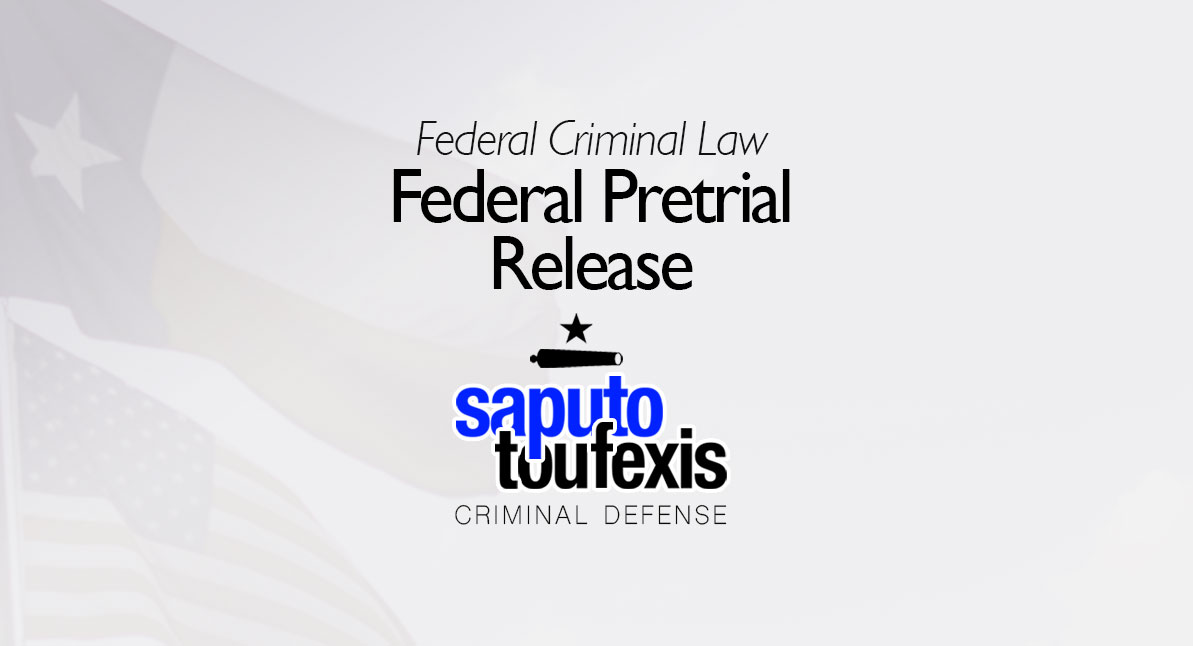The law and processes related to pretrial detention & bond in federal court is much more complicated than it is in state court. The processes vary somewhat by each district court, but the applicable law is the same across the country.
FEDERAL BOND & RELEASE FAQs
- How do I get released on bond in federal court?
- How long can the government hold you without a detention hearing? Can you postpone a detention hearing to get more time to prepare?
- What factors does the judge consider at a detention hearing?
- What is the law about bond & pretrial detention in federal court?
Do you need help with pretrial detention in a federal case? Book a consultation to discuss legal representation with attorneys Paul Saputo and Nicholas Toufexis today.
or Text or Call (888) 239-9305
How do I get released on bond in federal court?
If you are charged with a federal criminal offense, the first issue that you will need to address is bond and pretrial release. If you have been appointed an attorney, your attorney should have obtained a copy of the indictment or complaint, contacted the Assistant US Attorney AUSA and arranged for an interview with Pre-trial Services. All of this should have occurred before you have arrived in court for the hearing regarding your bond. This hearing is known as a detention hearing.
The judge has four options at a detention hearing: (1) release you either on personal recognizance or on an unsecured bond; (2) release you on conditions; (3) temporarily detain you; or (4) detain you until you have completed the entire court process (or until the court changes its mind).[1]
How long can the government hold you without a detention hearing? Can you postpone a detention hearing to get more time to prepare?
The government can seek to detain you for up to three days pending your detention hearing.[2] In addition, you or your attorney may desire to postpone the detention hearing to prepare for it more fully, and you may seek up to five days, or even more if you have “good cause.”[3]
Whether you have been detained pending trial or not, the detention hearing can be reopened any time before trial if new information comes to light.[4] Your federal criminal defense attorney would reopen this issue by filing a motion with the court.
What factors does the judge consider at a detention hearing?
The judge is supposed to consider the following factors:[5] the nature and circumstances of the offense charged, the weight of the evidence against the person (although this is supposed to be the least important consideration[6]), the history and characteristics of the person, and the nature and seriousness of the danger to any person or the community that would be posed by the person’s release.
What is the law about bond & pretrial detention in federal court?
The law regarding bond is primarily found in 18 USC § 3142[7]. Federal case law also applies to detention hearings and helps judges in applying § 3142. An important supplemental statute is 18 USC § 4285. This statute authorizes a judge to order the United States Marshal to pay a defendant’s transportation costs when the defendant is eligible for bail but is unable to pay for the cost of transportation to and from court.
Legal References:
^1. 18 USC § 3142(a)^2. 18 USC § 3142(f)(2):
…a continuance on motion of the attorney for the Government may not exceed three days (not including any intermediate Saturday, Sunday, or legal holiday)
^3. 18 USC § 3142(f)(2)
Except for good cause, a continuance on motion of such person may not exceed five days (not including any intermediate Saturday, Sunday, or legal holiday)…
^4. 18 USC § 3142(f)(2)
The hearing may be reopened, before or after a determination by the judicial officer, at any time before trial if the judicial officer finds that information exists that was not known to the movant at the time of the hearing and that has a material bearing on the issue whether there are conditions of release that will reasonably assure the appearance of such person as required and the safety of any other person and the community.
^5. 18 U.S.C. § 3142(g)^6. United States v. Townsend, 897 F.2d 989, 994 (9th Cir. 1990)^7. 18 USC § 3142^51. 8 U.S.C. § 3142(g)










